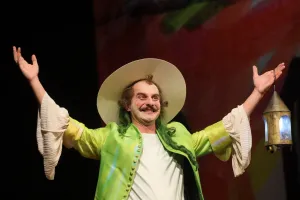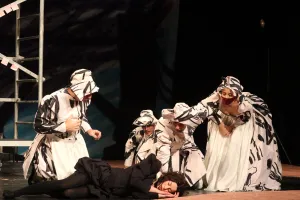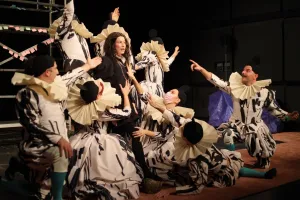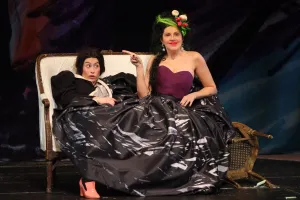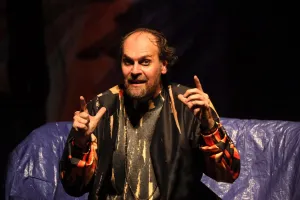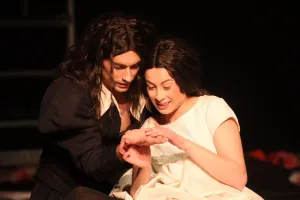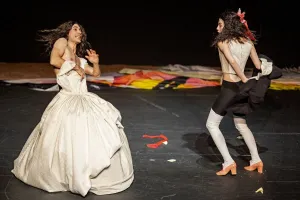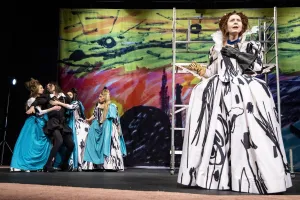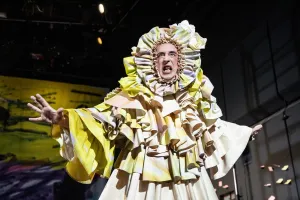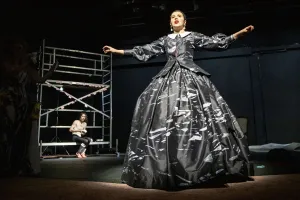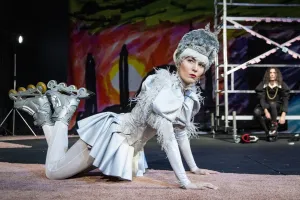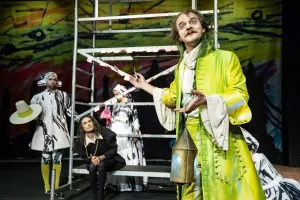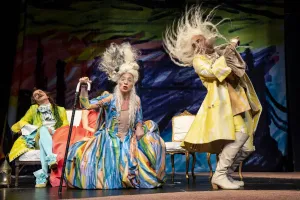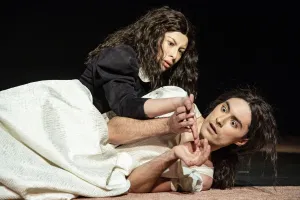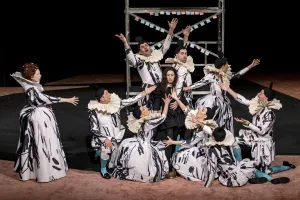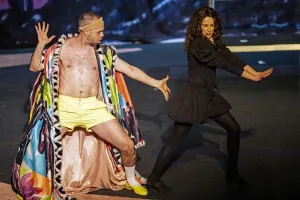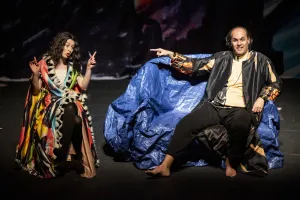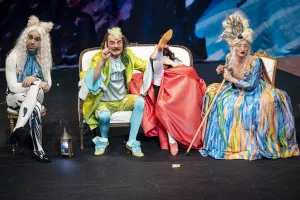Orlando
based on the novel by Virginia Woolf, dramatisation by Tanja Šljivar in cooperation with Goran Ferčec

A COLLECTIVE BIOGRAPHY OF THE ARTISTIC TEAM
Artistic team working on the play “Orlando” is linked by joint projects in the field of arts, particularly theatre in various constellations: Ilić and Djordjev since 1998, Mirković since 2003, Ferčec since 2005, Marojević and Djerić since 2007, Šljivar since 2012 and Papić since 2018. Bojan Djordjev, the director, Siniša Ilić, a visual artist and Maja Mirković, a costume designer, all collaborate in institutional theater and independent productions, and in 2019 they curated Serbia’s exhibition at the Prague Quadrennial of Performance Design and Space. Tanja Šljivar is a playwright interested in collective writing practices and in various models, media and formats of representation of performance texts. Goran Ferčec is a writer, dramaturge and collaborator in performance projects. Until now he has published a novel, a book of essays and a book of performance texts. Dijana Marojević is a full-time professor of diction, stage speech and rhetoric at the Faculty of Dramatic Arts. In addition to having worked as a speech coach in over 30 theater productions, she also works on television and film. Čarni Djerić is an actor, contemporary dance performer, director and co-author of numerous plays as well as stage movement director. Luka Papić is a film director also engaged in music through the project mangulicaFM, “Bicycle” the band and as a composer for theatrical plays. This is the first time that both Mina Milošević, dramaturge, playwright and undergraduate student and Maksim Milošević theatre director and master student of faculty of Drama Arts, collaborate with this authorial team.
ABOUT WRITERS AND THEIR NATAL CHARTS
The popularity of the novel “Orlando: A Biography” by Virginia Woolf and the frequency of its film adaptations (directed by Sally Potter in 1992) and also stage adaptations (Staatstheater Hannover – directed by Lily Sikes and Schaubühne, Berlin directed by Katie Mitchel), to mention only the most famous and the most recent ones, speaks volumes of an undeniable quality of this novel which is often unreasonably and too lightly attributed to many literary works and works of art in general – its timelessness. Queer and gender studies, sexual revolution and liberation, along with the status of sexuality, love, private possession and privacy in technocracy, democracy, on the Internet and in late capitalism, only additionally enrich the experience of a contemporary reader who, when holding the novel published for the first time in 1928, can let loose his imagination and always add new layers and plots, and potential transformations of the main and titular hero-heroine. This unusual and comprehensive narrative technique that Woolf uses here – an attempt to give an account of a unique life spanning over 300 years, a technique that Isidora Sekulić described as follows: “Only, the plan is wide, new, huge; Not only a life of a man as an adventure, but history, humanity, civilization, they are all in adventure”, promises and implies in its initial title “Orlando: Vita” a constant duplicity, playfulness and mystery. Vita is at the same time a Latin term for a biography and a first name of a female aristocrat, a writer, a colleague and a lover of Virginia’s – Vita Sackville-West who was a direct inspiration for this “longest and most charming love letter in literature”. This is a novel where a main hero-heroine lives for over 300 years without aging a day, a novel that spans over two continents, following Orlando, a young aristocrat, in his adventures ranging from a brutal play with a severed head of a Moor, to handing Queen Elizabeth rose water, and following lady Orlando as a woman living with a Gypsy tribe only to marry a seaman. Accordingly, Virginia Woolf’s narrative methods vary from utilization of false archives and historic data, through speculations and assumptions, to the funniest parodies and fictionalization of certain facts from Vita’s life. If Orlando is both a male and a female, a British nobleman and an untamed woman living homeless with the Balkan Gypsies and almost a meek wife and brothel frequenter, and a murderer, a poet, then astrology or rather a compound of natal charts is another potential method of understanding this extraordinary, unrepeatable, fantastic and impossible and yet, essentially and above all human life and experience. Primarily astrology, but also all other methods of divination, palm reading, fortune telling, clairvoyance used in the adaptation for me are only another way to tell a story, a story full of archetypes, psychology, ideas of becoming – a woman, an artist, a warrior, a wife. Since Orlando is so many things – few astrologers would be left indifferent when seeing such an imaginary “natal chart” full of contradictions and impossibilities which eventually all come to fulfillment. The novel itself does not lack “spiritual” and/or fantastic elements: the sex change is the consequence of Orlando’s seven-day’s sleep, assisted by a mystical visits of the three ladies: Purity, Chastity and Modesty, and sequence of the life with the Gypsies invokes a Gypsy method of the tarot reading. Generically created online analysis of Virginia Woolf’s natal chart (Aquarius, ascendant in Gemini, moon sign in Aries) says: “It is hard for you to express your deepest emotions from the heart and soul. You are efficient, concrete and not too emotional. What is important for you is what you see: you judge the tree by its fruits. Your ideas keep changing, words disappear, but actions are visible and remain.” At the same natal chart reader can find the following about Vita Sackville-West’s personality (Pisces, ascendant in Capricorn, moon sign in Cancer): “Your heart and your emotions are your driving forces, and you can’t do anything on Earth if you don’t feel a strong affective charge (as a matter of fact, the word “feeling” is essential in your psychology). You need to love in order to understand, and to feel in order to take action, to the detriment of a certain vulnerability against which you should learn to fight.” One of them, the object and the muse, has been described as pure emotion, made of water signs, the one who must love in order to understand, while the other, in whom air signs are predominant, describes, objectifies, communicates, and she has to understand in order to love, in order to love she has to write the entire novel and the longest love letter in history! The novel contains some deliberately inserted “gaps” and unknown facts from Orlando’s life, left out details, that the narrator wittily and humorously describes with passages like this: “The biographer is now faced with a difficulty which it is better perhaps to confess than to gloss over. Up to this point in telling the story of Orlando’s life, documents, both private and historical, have made it possible to fulfil the first duty of a biographer (...) But now we come to an episode which lies right across our path, so that there is no ignoring it. Yet it is dark, mysterious, and undocumented; so that there is no explaining it. Volumes might be written in interpretation of it; whole religious systems founded upon the signification of it. Our simple duty is to state the facts as far as they are known, and so let the reader make of them what he may.” I “filled in” those “gaps” in my adaptation by using various astrological methods or other kinds of divination, fortune telling or reading the past (like Turkish coffee or tea fortune telling, palm reading, tarot cards reading, Vlach magic, hodja’s writings etc.). I treated all divinations both with rational and ironic distance, and with the deepest passion and blind faith, just as I treated the hero – heroine Orlando, through the lenses of nine individual and three group narrators. One of such “gaps” or better to say blind spots in the novel is the colonial and imperialist history of Great Britain. As much as being progressive when it comes to gender issues and gender roles, Woolf is as reluctant to question other Orlando’s identity features which put him in the privileged position. shaping her heroine-hero she consistently establishes Britishness as an ideal, opposing to the traces of exotic otherness, and puts the British culture in the center of things while marginalizing all other cultural models of living. In my adaptation, and particularly in the scenes in Constantinople and with the Gypsy tribe, such position of center and margin and entire class and racist hierarchy is questioned and turned upside down – an unnamed Turkish lover and Gypsy Rustum are aware of Orlando’s privileges and their own underprivileged status, but by employing irony, linguistic bravura, mastering the narration and the narrative, and finally, by taking over the historic perspective they place themselves in the center, and the British nobleman-noblewoman is put on the margins of the story and thus to the margins of history. In various available adaptations, the specificity of the language and, above all, novelistic and literary tone of the original were transposed to the theatrical media in different ways: the adaptation by Robert Wilson and Darryl Pinckney is actually a monodrama in which narrative points of view change from the first to the third person, from singular to plural etc…; in the adaptation by Sarah Ruhl we have Orlando (who sometimes speaks of himself in the third and sometimes in the first person) and the choir (consisting of unspecified number of members of both sexes) who interchange at the stage as narrators. For the framework and starting point of our adaptation director Bojan Djordjev proposed 12 scenes, and in each scene one major character from the novel as a narrator. In our version Orlando is left almost speechless (although he fully participates in the relations and stage interaction with everyone), desired and unavailable until the epilogue, until the final scene and monologue, which, in relation to the contemporary context and the passing of almost another 100 years from the “present” moment of Virginia Woolf, was written by Goran Ferčec. The last sentence in the novel reads: “And the twelfth stroke of midnight sounded; the twelfth stroke of midnight, Thursday, the eleventh of October, Nineteen hundred and Twenty Eight.”, which is a reference to the novel’s publishing date. In Ferčec’s (and Orlando’s) soliloquy, the main topic is understanding the time and place as determinants of our living as well as the determinants of our so-called literature. Such polyphony – of authors, actors and narrative, allowed for Orlando – as a human being but also as a phenomenon to be perceived from several viewpoints: from the viewpoint of male lovers, female lovers, two queens, maids and servants, dogs, Gypsies, Turks, British, writers, contemporaries. The core of my interest in drama text lies in monologue, and in narration as a performative, and not only literary principle. Bojan Djordjev never ceases to find the most performative, the most choreographic and the most scenic solutions for staging my texts that he also described as “seemingly unstageable”. Kathy Mitchel described the novel “Orlando” as an “unstageable monster”. When I first started working on the adaptation of the novel “Orlando: A Biography”, my colleague and friend Ana Konstantinović, in a tarot reading concerning my writing and my love life at a time – drew a Major Arcana No. XI – Strength, in which a woman is pictured taming a beast. I took it as a sign and an inspiration to tame this “monster of a novel”, which I did with the greatest literary pleasure.
Tanja Šljivar
“CENTURY” – FRAGMENTS FROM ORLANDO’S FINAL MONOLOGUE “MRLJA” (THE STAIN) BY GORAN FERČEC
“I see the other side as if from a ship’s deck or from a lighthouse, a moment in time, and myself in the time and say, hold onto this timeless or transtemporal feeling but prevent it from becoming a myth, something recognizable which could easily become a story. The only truth, the greatest truth is that one needs to flee from a story because it keeps repeating, always the same over the time, it prefers to hold a human unchanged, stuck in just one time and just one possibility. The story likes time. The story in alliance with time is a damned virus. It is conveyed from generation to generation like a bad gene. Once you tell something twice, it is already infected with myth. It is necessary to avoid a story in order to escape the life’s customs of being obedient and repetitive. Therefore, it is necessary to turn it inside out and flee. And, in order to escape from a place and time, which can be done, it is necessary to break down the established chronology of centuries, decades, years, weeks, multiplied by height, width and depth. (Traits that fit into a bad sentence with too many commas.) They have to be tricked by a curvature. By leap years. By distortion. Everything — uneven. Everything — with no road signs. Everything — a jungle that inspires fear not curiosity.”
***
“A century is in no way made to human measure. It is a hoax, a construct too long for the temporality of a body. It is created for a duration which is not human. A library too vast to be read. Every life is too short for a century, and in spite of that, we still lay claim to it and still want to please it. We try to please the century like a dog does to his owner. We let it lead us at the same time we plot how to tame it. We say endearing words, our wonderful century, our horrid century, our century of progress, our century of doom. We rub its shoulders to cheer it up. We pamper its violent character hoping that it will not slap us. And then it slaps us across the face. Again. Hundred years of slaps. It is because we are held as hostages. Because we dare not look beyond it, or learn to count further than one hundred. You, our, darling century. Bam. Slap. A century is but a trick. That is why one must outwit it. Just step out of it. Break the number one and two zeros like a spine. The century needs to be tricked by all means available to one’s life. Trick it laziness. Trick it by oblivion after a fierce binge. Long walks from continent to continent. Singing revolutionary songs. A lot of fucking in the interior and exterior. Sleeping during the day. Decadence in the night. Owning a castle. Readiness for the castle to be lost or taken over by people. Writing with a pencil. Starting things without the intention of finishing. Trick it with a guillotine instead of a bicycle. Trick it with a virus, with travelling only with a backpack. Riding in public transportation by dodging the fare. Overthrowing the government. One should be stubborn. Do not write the name on the apartment door. Hide the address. Turn off satellite guidance. Climb the oak tree before becoming aware that you are afraid of heights. Feed other people’s cats. Always ask for higher fees. Keep repeating that social class is like plastic, an environmental-existential problem that will mark our ruin. Walk between cities. Avoid Europe. Leave excessive tips in the restaurant. Steal books that will not be read. Do not consent to marriage. Refuse fidelity. Refuse everything that could resemble blackmail. Leave the parent’s home as soon as possible. Rape own mother and kill own father. Or kill mother and rape father. Symbolically. Burn the inheritance. Literally. Stick a female finger into a male arse. Stick three fingers. Get drunk on wine. (Now the myth has sneaked up close again. When a big story comes too close, it needs to be kicked with the foot). Listen to music that remained unfinished. Write the names of male and female lovers on the façade walls. Do not accept the truth as an undeniable category, or even worse, a moral category. Keep the truth far away from art. Always carry along domino blocks. Write down the dreams. Avoid the town center. Claim that art is the most important thing in the world. Grow pineapples on the tree. Learn how to determine the time by the position of the sun and the moon. Read Brecht. Quote Marx and Spinosa. Bring god finally to its end. Make a mistake in naming your own gender. Abolish the frightening sadism ingrained in the word destiny. No longer be trapped by destiny. Look into people’s faces. Enter drunk into a toilet of the opposite gender and look in the mirror. Come out into the night as someone else. With rough gestures that have become gentle. Purposeful moves that have become purposeless. Speak about the body as something good. Send someone a dickpic. Start a conversation with a stranger. Comprehend the vital link between the trees, birds and man, but without becoming messiah or enlightener. Never say (after I understand what the century expected me to be and is still expecting), never say I think the spirit of this century has finally taken me and broken me. The century has to be duped by an experience which it cannot usurp, duped by knowledge that it will not be able to use, monetize, sell, resell, turn into gold. Disappear and reappear in places where no one expects. Ask millions of questions. Sink several ships carrying food. Buy in cash only. Or steal. Windows have to be opened on each century to make a draft that will decontaminate that stale curiosity cabinet, scatter the pack of tarot cards of the Gipsy Rustum el Sadi, turn over the ink with the goose feather, blow away the crinoline as a balloon and tear down the exotic wallpaper with the profiles of Moor heads and tropical birds from the walls of three hundred and sixty five rooms, drawing rooms, apartments, halls through which prowl Queen Elizabeth, Russian Princess Sasha, starving poet Nick Greene who cannot eat from talking about himself, the Norwegian whippets and aggressive mastiffs that do not like poets, Romanian Archduchess who, when she feels like it, raises her dress, squats and pees in the courtyard, unnamed Turkish lover who shoots rockets in the night, invisible ladies of Chastity and Purity, but not Modesty, who monitor the tightly kept thighs of Queen Victoria, Shelmerdine whose hair and ships only wait for a favorable wind. One cannot breathe any more from all these corpses. Century’s favorites. The like of them are struck through in the first reading. With a red pencil. The century has to finally be made silent, like Madame du Deffand after having talked continuously for fifty years. Or turn into what it will turn anyway, into an image. One single image. Which takes the breath away. What is the image that hushes the chatter of the century, that forces it to condense, give up on its class love for the chosen ones, to crash the middle-class blues of comfortable living, turn around and look at the crap it had left behind. If I try to describe it, it does not remind me of anything. I approach closer. It could be a tame English landscape, but it is not. Another step closer. It could be Bosporus in a foggy dawn, but it is not. It could be a Norwegian glacier at the time of the winter solstice. I make a step. Or a confluence of two rivers in the dusk in an oligarchic view from above. But it is not. Or sea foam around the Cape Horn. I make a step. Maybe it is just a paper over which someone had spilt ink, and the paper has turned grey from the blot and formed a geographic map of the new world. I step closer. Maybe it is an oil spill at sea. Maybe it is a whale resting. Maybe it is a pine forest. I make a step. Maybe it is a wallpaper in a drawing room printed with thickly intertwined plants growing only in the colonies. Maybe it is a cracked pavement. Or indecipherable scribbling on the wall. Another step. Maybe it is the bark of Orlando’s oak tree. With the next step I come close enough that all possible readings of the image disappear and there only remains what the picture actually is, a plain stain that represents only a stain. Nothing but a stain. I address the century gruffly, with contempt for its limitations (it has become personal now), without endearing words I say to the century to give me a sign, directions on how to read the picture in the year two thousand twenty into which I want to turn it into. Silence. The century is silent. It is retaliating for the tricks. I make another step which brings me absolutely close to the picture and which shows that each stain in the stain in the stain in the stain in its minutest detail becomes a face. Faces visible only when a person comes so close that he does not see anything around him, but just the surface of the picture, when he erases all the surrounding world. The unknown faces that force me to remain immobile and think of everything I was or could have been, all those men and women that the sneaky centuries continuously use and exploit, without actually offering them anything. Used. Prostitute Nell, marathon runner whose heart gives up on him at the goal line, a homeless after the earthquake, a boy with coloured nails riding his bicycle on a quiet afternoon in a deserted street of a provincial town, dog on a chain in the backyard, forgotten child, illiterate folk poet, crying butcher, actress eternally in supporting roles, Chinese construction worker on a bridge, person feeding pigeons because he doesn’t have anyone else to feed, Gypsy tribe from the Balkans, laborer picking peas, writer who accepts the destiny of belonging to a minor language, school bus driver that has no children of his own, refugees continuously crossing borders and who, after being returned, cross again and crush the century as a lump of damp salt. Centuries of faces that do not speak but move, trick, work, and in that movement transform the stain that could not be discerned at the beginning, into a storm, a wave, lava that wipes everything standing in the way.”
VIRGINIA WOOLF: BIOGRAPHY
“The biographer is now faced with a difficulty which it is better perhaps to confess than to gloss over.“
“Orlando”, Virginia Woolf
Contrary to the direct approach to Vita Sackville-West and the literary genius that enabled Virginia Woolf to grasp the illusive Orlando’s personality and create from a historical figure a multidimensional contemporary literary characters, the biographer of this modest biography will be able to fulfill only “the first duty of the biographer, which is to plod, without looking to right or left, in the indelible footprints of truth; untainted by flowers; regardless of share; on and on methodically”.
“Our simple duty is to state the facts as far as they are known, and so let the reader make of them what he may.“
Adeline Virginia Woolf, born Stephen (1882–1941) was an English writer of the stream-of-consciousness novels and numerous essays, among which are those in which she set up the basis for feminist literary critique. Since education was either limited to women of her time or made highly inaccessible, she received her education at home at first, helped greatly by her father’s library, who allowed her to read whatever she wanted, and with the aid of her brothers’ acquaintances, who, as men, were allowed to attend the University of Cambridge. She gained her formal education at the Ladies Department of King’s College in London, where she studied history, Greek, Latin and German. She made an important friendship with her mentors who were renowned feminists at the time, like Clara Pater and Janet Case, who fought for the availability of higher education to women and who had a significant impact on Virginia’s political views. Although her parents did not look benevolently on women’s education, her father supported her in her writing career, as writing was considered a respectable profession for women, which was very much due to Virginia’s predecessors – Jane Austen and the Brontë sisters. However, the social atmosphere of the Victorian era was nevertheless not favorable for women, hence, for women writers as well; Virginia describes it with the words: “Society in those days was a perfectly competent, perfectly complacent, ruthless machine. A girl had no chance against its fangs. No other desires – say to paint, or to write – could be taken seriously.” Virginia levels a clear critical eye against the Victorian era in her works, in “Orlando” as well, criticizing the society gathered in the salon of Madame du Deffand as a choir of Victorian public opinion. Unlike the affected salon of Madame du Deffand, in the early twentieth century, Virginia had her own free-minded society – Bloomsbury Group, consisting of her friends, writers, philosophers, painters who studied together and lived close to Bloomsbury in London. Her views were feminist, pacifistic and sexually liberating. The remarks of Dorothy Parker about this group were: “they lived in squares, painted in circles and loved in triangles”. However, Virginia started considering this company too intellectual and skeptically devoted to rationalism, and for a certain period of time she joined the Neo-Pagans of her friend Rupert Brook, whose aim was practicing socialism, vegetarianism and nudism. Despite her disdain for marriage, Virginia married Leonard Woolf, whom she described as a “penniless Jew, who was a socialist and eminent member of the Labor Party’’. In spite of the fact that she rejected his proposal to marry the first time, Virginia and Leonard loved each other and even lived happily until the end of their lives – according to Virginia’s words in her suicide letter written to him – “I don’t think two people could have been happier than we have been.” The Woolf couple founded their own publishing house – Hogarth Press, where Virginia published her own works. However, the company would have gone bankrupt had it not been for Vita Sackville-West, a popular and acknowledged writer at the time who published several novels at Hogarth Press in order to help the Woolfs. Vita Sackville-West was Virginia’s lover and friend for many years, to whom Virginia dedicated her novel “Orlando”. Vita’s son, Nigel Nicolson wrote about “Orlando”: “The effect of Vita on Virginia is all contained in Orlando, the longest and most charming love letter in literature, in which she explores Vita, weaves her in and out of the centuries, tosses her from one sex to the other, plays with her, dresses her in furs, lace and emeralds, teases her, flirts with her, drops a veil of mist around.“ Virginia’s most prolific literary work began with Vita, as Vita encouraged her and tried convincing her that writing is the cure for her mental health, and not a source of her mental problems, as she was made to believe by her father and his doctor since her adolescence, advising her to engage in exhausting physical activities, like gardening, in order to establish a balance with “excessive thinking” and writing, which they believed were harmful for her. Virginia suffered from a bipolar personality disorder which is characterized by manic, productive phases in which she was creating, and depressive ones, in which she suffered nervous breakdowns and attempted suicide twice. She killed herself in the end by drowning in the Ouse river in 1941 at the age of 59. Virginia’s nervous breakdowns began in her youth, following the death of her closest family members – her mother died when she was thirteen, not long after that her sister Stella, who was her greatest role-model, and soon thereafter, her father as well. However, her biographer, Quentin Bell, pointed out that the possible reason for Virginia’s poor mental health was the sexual abuse suffered by her and her sister Vanessa in their childhood and adolescence, especially after the death of their parents, by their half-brothers George and Gerald Duckworth, first time when Virginia was six. Virginia described these events: “The old ladies of Kensington and Belgravia never knew that George Duckworth was not only father and mother, brother and sister to those poor Stephen girls; he was their lover also.” Yet, it seems that Virginia herself understood the cause of her illness which links also the sexual violence she had suffered, consideration of writing harmful for woman and inadequate psychiatric practice, which, as everything else, was in the grips of patriarchate (not so long before Virginia’s time, reading the novels was considered a reason for “woman’s madness” and for institutionalizing women). The cause, of course, is the oppression of women in a patriarchal society. In 1929 Virginia wrote an essay “A Room of One’s Own” considered the foundation of feminist literary criticism, and she declared that, had Shakespeare had a sister with a gift equal to his, “she would certainly have gone crazed, shot herself, or ended her days in some lonely cottage outside the village, half witch, half wizard, feared and mocked at” and also: “When, however, one reads of a witch being ducked, of a woman possessed by devils (… ) then I think we are on a track of a lost novelist, a suppressed poet, or some mute and inglorious Jane Austen“. In “A Room of One’s Own” as well as in the essay “Three Guineas”, 1938, Virginia meticulously analyzed the reasons for a small number of female writers, pointing out the fact that the women are deprived of economic power, as well as of access to higher education. “A woman must have money and a room of her own if she is to write fiction.” says Woolf. In the spirit of her female mentors, Virginia sees the struggle for education made available to women as one of the most important struggles: “Once she knows how to read there’s only one thing you can teach her to believe in and that is herself.’’ (“Monday or Tuesday”, 1921)
The characters of Virginia’s novels picture a portrait of a woman that has to liberate herself or a liberated woman, from depressive housewife Mrs. Dalloway, to an incredible, omnipotent, androgynous Orlando. Virginia skillfully combines the idea of feminist awareness and liberation of woman from the historical slavery of patriarchate (“For we think back through our mothers if we are women”) with the idea of liberation from gender (“It is fatal to be a man or woman pure and simple; one must be a woman manly, or a man womanly,”) (“A Room of One’s Own”) which is why she is considered the key figure of the feminist movement, which which incorporates her in its canon in the seventies, as well as of the queer movement, showing the essential link between the female and LGBT liberation. Woolf also actively supported the pacifistic and antifascist values, and succeeded in formulating a critical attitude towards her own privileges in her essay “Am I a Snob?”, 1936 wherein she concluded that she is an elitist and snob, and yet, she succeeded in criticising the colonization, British imperialism and nationalism, as well as racism, which is particularly visible in “Orlando”, which we can presume is the influence of her socialist-oriented politically active husband. Virginia Woolf’s best known novels include: The Voyage Out (1915), Mrs. Dalloway (1925), To the Lighthouse (1927), Orlando: A Biography (1928), The Waves (1931), Flush: A Biography (1933), The Years (1941) and Between the Acts (1941). Virginia Woolf’s prose is characterized by a pronounced lyricism by which she conjures visual and audio impressions, enriched by an unusual system of metaphors linked to the main plot motif.
„And halting at length, out of breath, she said, panting slightly, that he was like a million candled Christmas trees (such as they have in Russia) hung with yellow globes; incandescent; enough to light a whole street by; (so one might translate it) for what with his glowing cheeks, his dark curls, his black and crimson cloak, he looked as if he were burning with his own radiance, from a lamp lit within.”
“Orlando“, Virginia Woolf
Virginia Woolf’s novels were marked as experimental, considering that she departed from the classic form of storytelling, even more so from telling a “big story”. The narrative in her novels has no specific events; the plot that Woolf focuses on can rather be described as banal, plain, ordinary, mundane. Even the fantastic “Orlando” is essentially a biography, a series of events and meetings in the life of an aristocrat. However, she, like Chekhov, refracts such a plot through a prism of highly elaborated and profoundly psychological stream of consciousness of the protagonist, so that daily events rendered so unusual can be viewed from a different perspective, and personal can finally be recognized as political, and the greatest silent yet fatal inner conflicts of the heart can find their resolution. Woolf uses her lyricism as a way to create a poetic vision in the ordinary. Through her works she gave voice to the oppressed, those leading small, ordinary lives and those that remain in the shadow of history, those that had never been the “darlings of the century”, “all those men or women whom the vile centuries continuously use and exploit without actually offering them anything” (“Orlando: final monologue “The Stain””, Goran Ferčec).
Mina Milošević
DRAMATURGE’S NOTE
Orlando and Non-Orlando: Overcoming Otherness
The Colonial Politics of Falling In Love
“Orlando” by Tanja Šljivar is the adaptation of the novel of the same name written by Virginia Woolf, the longest love letter in the history of literature that Woolf dedicated to her lover, Vita Sackville-West, starting with its very title: “Orlando: Vita”. The term “vita” refers to the name of Sackville-West, but also to the term “biography”, because in this novel the author attempts to capture and describe Orlando’s/Vita’s personality by describing his/her life as a life of a nobleman who lives for over three hundred years, not having aged a day, who changes sex, without changing his personality in the slightest, with whom everybody is in love, but who has been only in search of his writing his entire life. In trying to describe Orlando’s personality, it is as if the narrator (male or female) attempts to unravel what is it that makes him so magnetic and why such a person is the object of infatuation.
“He – for there could be no doubt of his sex, though the fashion of the time did something to disguise it – was in the act of slicing at the head of a Moor which swung from the rafters”.
“Orlando”, Virginia Woolf
In her adaptation Tanja Šljivar openly politicises this story placing it inside a clear theoretical framework – this is a story of an aristocrat, a rich coloniser who is privileged by his class and race, by his “Britishness”. He often sets out on journeys and tries out “exotic” cultures by appropriating the lives of the oppressed, the exoticised, so he, as a white woman embarks on an adventure to “taste the charms of the Orient” in Constantinople, which is pure exoticism when compared to his British civilisation heritage, or when she was living with a Gypsy tribe when it doesn’t take much for her to feel as a “free spirit”, but these escapades of hers are only episodes after which she would always return to the comfortable safety of her Britishness and class privileges. “Orlando had that luxury to address the identity politics”, the character of Rustum the Gypsy says about his lover. “She could always choose moments when she would consent to be discriminated as one of us, moments when she would be even willing to take the burden of being a person of color, only to shake this burden off with such ease at any time if it becomes too heavy, too tedious or simply whenever she gets bored with, let’s say, mere fascination with nature.”
The characters in this play, many narrators in the role of a biographer, try to describe Orlando in their monologues and to determine the identity of this fatal, magnetic and elusive creature. However, it becomes clear that Orlando’s identity owes its elusiveness to his plurality – Orlando is both a man and a woman, a Taurus and a Scorpio, a Dionysian dual personality in whose honour this theatrical performance is staged. All Orlando’s narrators, lovers, both male and female, are mere Bacchantes in a trance celebrating Eros trying to determine Orlando’s identity by comparing it to their own, they all are just mere gender caricatures, identified as “others”, as “Non-Orlando”.
“What does your mirror say? It’s always the other one who looks back. We seek him, when we tunnel through unknown bodies, away from ourselves”.
“Quartett”, Heiner Müller
“Such thing as being British, being white, cannot exist if there is nothing in relation to which it can be determined, and in this case, the lord could be easily determined in relation to the Moor’s head that has just been severed.”
“Orlando”, Tanja Šljivar
Hence, this play unites two largest conflicts in history of both “masculine”, political, military, combative and “feminine”, romantic, melodramatic genres – a conflict between a conqueror and a slave and a conflict between an object of infatuation and a subject who is in love, and it elaborates what was on the tip of everybody’s tongue – in a conquering, colonising world the love itself is conceptualised as a conquest and the process of love colonisation seems as painful as the process of political colonisation. All Non-Orlando characters ache for Orlando seeing in him the very thing they “miss”, the thing that makes them “less worthy” than him. Thus, the elderly Queen Elizabeth sees her youth in him, the Russian princess, Sasha, sees in him the Western civilisation in comparison to which she is a barbarian, the poet, Nick Greene sees in him money and the status of a nobleman, the Romanian Archduchess and later on the Romanian Archduke, in both cases gender caricatures, with increased femininity of a “madam” and increased masculinity of a “groom”, see in him/her their monogamous destiny with clearly defined roles of male-female. The unnamed Turkish lover sees in him civilisation in comparison to his Orient, Rustum the Gypsy sees a white woman in her, a higher class member, Madame du Deffand and her company from the salon see in Orlando an intrigue, a thing of interest, a puzzle which is quite opposite to their dull snobbish lives, Nell, the prostitute, sees in Orlando the first person in front og whom she can take off her femininity mask (even the brassiere as its symbol) and stop being a dehumanised body engaged in unfulfilling sexual intercourses with her clients which she finds quite repulsive, to put it mildly, and Shel sees in Orlando his soulmate – a person of the opposite sex who equally belongs to his own gender as much as he belongs to hers.
However, in each following scene Orlando leaves Non-Orlando more and more baffled by his self-centeredness and inconstancy. Absorbed in the pursuit of his writing, he is too occupied to play the role that was attributed to him by birth – he does not show much interest in playing an aristocrat, a master, a man, a conqueror, although every Non-Orlando character is always ready to greet him by playing an expected complementary role of a conquered person. When Queen Elizabeth I falls into a trance from grief that she caught Orlando kissing other girls, Orlando quite calmly writes her a wordless farewell letter which leaves her lost for words. The unexpected escape from the gender role provides the comic element of this play and brings forward its potential for setting oneself free from gender roles, from patriarchy and class society – from every kind of colonisation and enslavement.
Through playfulness and plurality of motifs of gender performances, the character of mankind given in the undefined, androgynous Orlando overcomes the relationships of domination and enters into relationships of egalitarianism. From horrific determinism that the notion “fate” bears Orlando, in his final monologue, (author: Goran Ferčec) when he finally finds his voice, says: “A century is but a trick. That is why one must outwit it. Just step out of it. Break the number one and two zeros like a spine.” And he adds to his recipe for liberation: “To read Marx and Spinoza” referring to the abolition of class society and replacing church authority and God by pantheistic perception of the divine power. Whereas Non-Orlando looks for a divinity in Orlando, who is superior in class to him, in the world in which God was devised in order to justify class division and hierarchies which spring out from it by maintaining his position on the top of this hierarchy, Orlando, yet, searches for a divinity in nature and arts, and it will turn out that for Orlando, God is collective polyphony of all the voices that make a century and mankind. It becomes clear – otherness is a manner of maintaining class society and order of a “century”. Every falling in love is, therefore, a desire to overcome otherness; to break free from narrowly restricted, oppressed position; to abolish categories; to be set free; to move from patriarchy to the regime of love with the help of a fatally attractive person, like in the play of the same name written by Tanja Šljivar which was also directed by Bojan Djordjev.
GENDER LIBERATION TROUGH A FEMALE VOICE
Once that the most mystified thing in this world – sex – has been finally demystified and politically interpreted, under a vague story of falling in love, a story about women’s writing starts to emerge to surface more vividly, or even – about searching for the voice of humanity. “Orlando” is considered to be one of the most important novels as it relates the history of women’s writing, written by one of the greatest female writers and explicitly addresses the issue of gender. Since the dawn of time, or better even, since the beginning of patriarchy and class society, or as Orlando puts it – ever since we count “centuries”, there is a clear distinction between male and female. Everything in this world comes in pairs, from blue and pink baby socks to the above-mentioned classification of dramatic genres: political genres are for male audience, romantic ones are for female, with the first category more frequently glorified, while the second one, particularly in these times when insensitiveness becomes a fashionable trend, is considered to be a kitsch at worst, or a “guilty pleasure” in the best case. Despite the feminist and sexual revolution and alleged opening and/or revaluation of canons, female authors are still searching for their voice. Simone de Beauvoir on the first pages of “The Second Sex” speaks of a female writer who refused to be published together with other female writers, but she pulled all her husband’s strings in order to be published with other men, because she felt it was the only way for her to be renowned as a writer. Female writers are a laughing stock – the very word female writer in Serbian still has a pejorative connotation and women can feel that and for that reason refuse to identify with something that is ridiculed and denoted as worthless. So they choose an easier path and identify with men. Let’s leave aside the fact how many female authors have won NIN Award so far – rather, let’s focus on how many novels have won NIN Award who had a female protagonist instead of a male one? Insignificantly small number. Because women, as Lana Bastašić puts it, know that great novels usually do not start with a sentence: “I woke up at 8:00 a.m.” (told by a woman) but rather with “I woke up at 8:00 a.m.” (told by a man), and they consciously or subconsciously identify with a male subject, so that they can rely on a male history of writing that pushed women aside, women who were first denied education, then they were denied publication, and finally they were not allowed to think that their works are worth reading. That is why Virginia Woolf was quite clever to start her novel about the history of women’s writing and searching for a female voice by writing it in masculine gender – the protagonist of this biography is Orlando – a nobleman who lives for three hundred years without aging a day, with whom everybody falls in love, and whose sole desire is – to write. Thus, the play by Tanja Šljivar also starts with a distinct determinative pronoun: “He”. However, Woolf makes a masterful twist in the middle of the novel by changing Orlando’s sex and moves on as if nothing had happened – Orlando’s personality remains unchanged, only material circumstances that he gets into change. As a woman, she does not enjoy inheritance right, so she is forced to get to the marriage market at which Queen Victoria, the queen of matrimony, patriarchy and colonisation, will have to dress Orlando in all the crinolines and corsets that women have to wear and to teach her all the skills that women must master (such as spinning a spindle) so that they can be perceived as valuable goods on the marriage market. Nevertheless, Orlando is resolute and keeps writing her poem “The Oak Tree”, dedicated to nature, to the world, to all those peculiar social relations that she has seen in abundance and which should be overcome. The penultimate sentences in the novel read – “It’s the goose! The wild goose!” which Orlando exclaims looking into the sky and which refer to the never written Vita’s masterpiece. At one occasion Virginia stated that she thought Vita was an average writer, so she decided to write a piece instead of her which would become that elusive wild goose and elusive Orlando’s personality the capture of which was recorded by the last sentence in the novel which stands for the publishing date: “The twelfth stroke of midnight sounds on Thursday, October 11, 1928.” However, in this dramatisation Orlando still gets her voice and historical justice in the end and when she starts her final monologue, she relates her recipe for the liberation of mankind, and that recipe is – to have no recipe; to flee from a recipe and to flee from “big story”. The voice of liberation of mankind shall be heard only when women finally get their own voice, but not until the views of men and women unite can we surmise the complexity of the world and unleash its biggest shackles – gender. The director opted for the role of Orlando to be played both by a man and a woman, so thus both men and women break the shackles of their gender roles and show us that the liberated androgynous vision of Orlando is a universal ideal of mankind and that Orlando is actually – “everyman”. As the director of the play, Bojan Djordjev, pointed out: “Orlando must become a woman first in order to become a human being”, he must endure the suffering and walk in the shoes of the oppressed in order to understand this world and act nobly in it. On the other hand, Orlando the woman must find her own voice and must write and must compensate for the centuries of female history being marginalised. The first change in Orlando is actually finding his own voice – transformation from silence to speaking, from being an object to becoming an active subject who changes the world with his words. Nevertheless, the greatest change in Orlando is the non-occurrence of any essential change after his sex change: male or female – it is irrelevant. Orlando, with its double performances and the cast that includes both an actor and an actress, with a range of characters of different gender identities – stands as a vision of a new world, a world without a sadistic nature of expecting a century, a noble and unpredictable world in which men and women will not differ that much and social classes will be ancient history.
Mina Milošević
Premiere performance
Premiere, 1. April 2021 / “Raša Plaović” Stage
Adaptation of the novel Tanja Šljivar
Author of Orlando’s final monologue Goran Ferčec
Directed by Bojan Djordjev
Dramaturgy Mina Milošević*
Stage Design Siniša Ilić
Costume Design Maja Mirković
Music Luka Papić
Speech Coach Dijana Marojević
Movement Director Čarni Djerić
Executive Producer Vuk Miletić
Producer Jasmina Urošević
Assistant Director Maksim Milošević
Assistant Costume Designer Marija Stošić
Stage Manager Sandra Rokvić
Prompter Marija Nedeljkov
Digital processing of set and costumes Jovan Tarbuk
* A student of Dramaturgy at the Faculty of Drama Arts at internship
Premiere cast:
Orlando Dragan Sekulić / Iva Milanović
Queen Elizabeth I Aleksandra Nikolić
Sasha, the Russian Princess Kalina Kovačević
Nick Greene, the Poet Nikola Vujović
Romanian Archduke/Archduchess Zoran Ćosić
The Unnamed Turkish Lover Pavle Jerinić
Rustum the Gypsy Miloš Djordjević
Madame du Deffand Vanja Ejdus
Nell, the Prostitute / Queen Victoria Sena Djorović
Marmaduke Bonthrop Shelmerdine Iva Milanović / Dragan Sekulić
and others: servants and maids, young women, old nanny Carpenter, dogs, guests at the ambassador’s party in Constantinople, Ladies Purity, Chastity and Modesty, guests at Madame du Deffand’s salon, Prue and Rose - prostitutes and textile workers, a gentleman passing by, Prince Albert, delivery man
Make up Marko Dukić
Lighting Design Milan Kolarević
Stage Crew Chief Dejan Radenković

